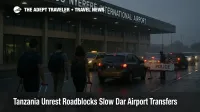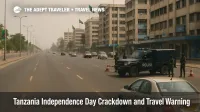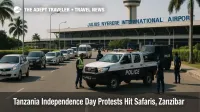Civil Unrest
The experience of travel can be an enriching journey that exposes individuals to new cultures, traditions and landscapes. However, the dynamics of human societies imply that the landscapes of our world are continuously evolving. Civil unrest, strikes, demonstrations, pandemics, and other forms of social disruption often unexpectedly materialize as part of these changing landscapes. These unpredictable circumstances can significantly impact travel plans, potentially causing delays, cancellations, or dramatically altering your intended travel route. Even more seriously, they can pose risks to personal safety. Understanding civil unrest as it pertains to travel, including its causes, repercussions, and how to respond, is essential for any traveler who wants to stay informed and safe.
Civil Unrest: An Insight
Civil unrest refers to collective expressions of dissent and protest that may entail public demonstrations, strikes, or even violent confrontations. Such disturbances often arise out of underlying societal tensions, whether they be economic inequality, political corruption, racial discrimination, or other deeply ingrained issues. These manifestations of unrest can occur suddenly, shaking the tranquility of a city, region, or even an entire country, and may pose a threat to the physical safety and general well-being of inhabitants and visitors alike.
Frequent instances of civil unrest across the globe wield varying levels of volatility and pose different degrees of risk to travelers. Places with higher frequencies of civil unrest include Hong Kong, Beirut, and Santiago, where political protests often turn into clashes with law enforcement. However, civil unrest is not exclusive to any particular region or country and may ignite anywhere societal friction or conflict exists.
Implications for Travel
Civil unrest can dramatically affect travel plans. The onset of protests and strikes often result in sudden road closures, disrupting public transport and private vehicle movements alike. Demonstrations can also lead to closures of important attractions, hotels, or whole sections of cities. In some circumstances, airports can also temporarily shut down, delaying or even cancelling flights.
Beyond the logistical implications, civil unrest poses significant safety risks. Clashes between protesters and police can involve usage of tear gas, rubber bullets, and even lethal force. Innocent bystanders, including tourists, can unfortunately get caught up in such incidents causing them harm. Further, frequent civil unrest can also lead to increased crime rates, creating a generally more dangerous environment for travelers.
Travel Advisory Services and Insurance
Travelers can leverage several resources to stay informed about civil unrest scenarios. Governments often provide travel advisories for their citizens to update them about potential risks associated with traveling to different countries. These advisories cover a range of topics including civil unrest, crime rates, health issues, and natural disasters.
Travel insurance is another tool of protection against the consequences of civil unrest. Various insurance companies offer plans that cover trip interruption or cancellation, medical expenses, and eve emergency evacuation owing to civil unrest. It's crucial for travelers to carefully read the terms of these policies before purchasing, as coverage for incidents related to civil unrest can vary significantly among different insurance providers.
Handling Civil Unrest during Travel
With adequate preparation and a sense of caution, travelers can navigate through situations of civil unrest reasonably safely. The first rule of thumb is to avoid areas of unrest and conflict as much as possible. Check local news frequently for updates about possible demonstrations or strike activities. Social media can also serve as a valuable source of real-time updates.
Should you encounter a demonstration while traveling, keep a low profile and leave the area as quickly and quietly as possible. Don't engage with the protesters and seek immediate assistance if you feel threatened. Registering with your embassy or consulate can also ensure their ability to contact you with pertinent updates or assistance.
Conclusion
Civil unrest as it pertains to travel is a case of the dynamics of societies spilling into the experiential sphere of the outsider – the traveler. It's crucial to remain informed and vigilant during travels, especially during volatile periods. Being aware of such scenarios helps travelers prepare better and deal proficiently with any incidence of civil unrest. In the grand scheme of things, being prudent about such risks may add an additional layer of complexity to travel planning but allows for safer and smoother voyages, ensuring you can fully embrace the joys of discovering new territories.
Lufthansa Extends Tehran Flight Suspension to Jan 28

Iran Unrest Widens Flight Cuts Via Dubai, Doha, Istanbul

Tanzania Unrest Roadblocks Slow Dar Airport Transfers

Tegucigalpa Election Protests Block Roads Near TGU

Bulgaria Gen Z Protests And Government Fall Hit Travel

Tanzania Independence Day Crackdown And New Travel Warning

Tanzania Independence Day Protests Hit Safaris, Zanzibar

Tanzania Unrest, What Travelers Should Do Now

Handling Sudden Civil Unrest on Your Travels

